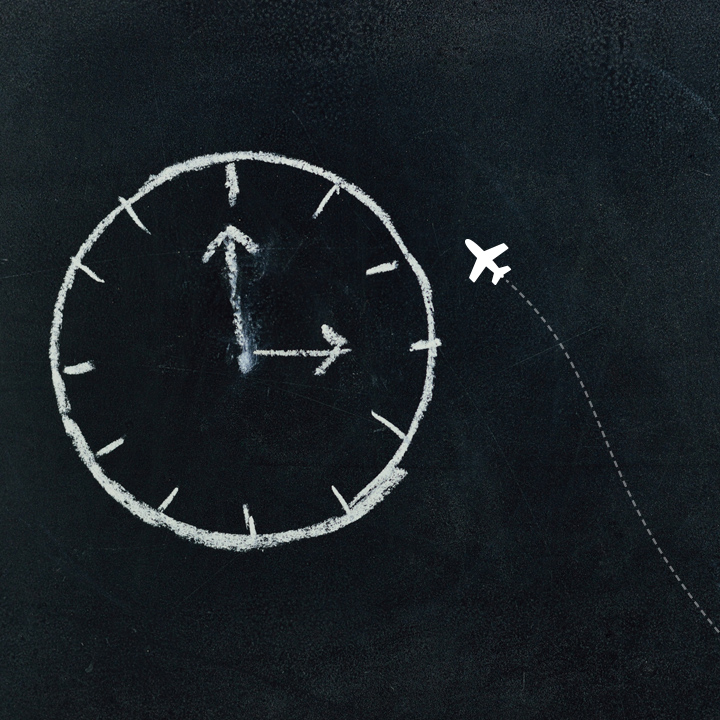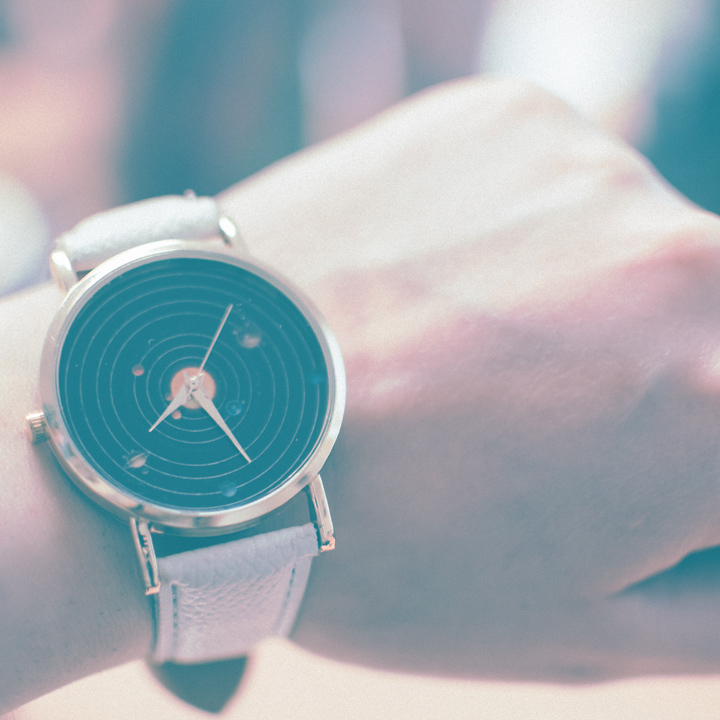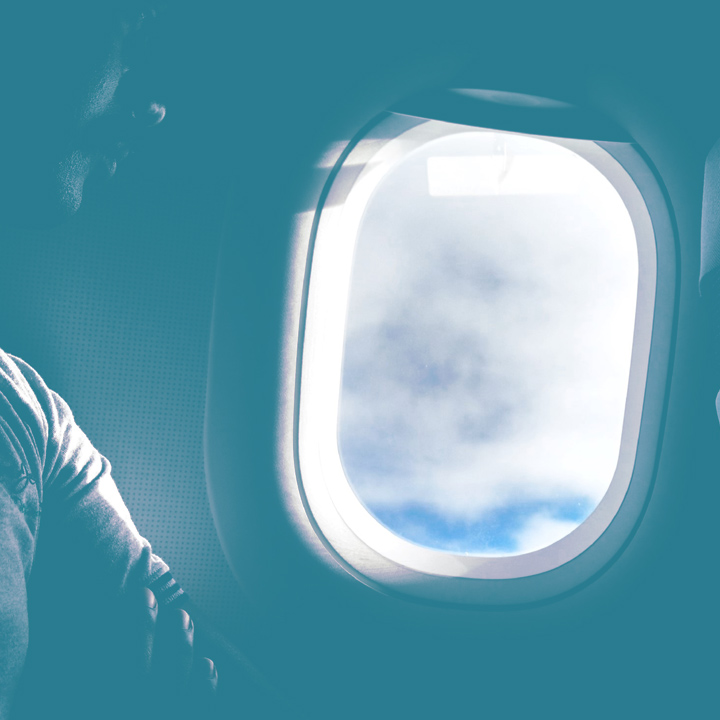Jet lag is NOT caused by lack of sleep.
Despite how true this feels when we’re in the throes of jet lag symptoms, the physiological condition is not caused by insufficient sleep but rather our internal clock getting confused. Jet leg recovery is not easy.
It’s only been in the past 100 years that we’ve been able to jump time zones as fast as we do now. Hurtling through the air at inhuman speeds is a wonder of technology and amazing for getting from A to B faster… but it can play some serious tricks on our biological time.
It’s true that jet lag afflicts some more than others. Those that it affects know the signs well; drowsiness, irritability, muscles aches and insomnia lasting up to a day for each time zone crossed.
Instead of suffering through days of physical and mental discomfort the next time you cross time zones, take note of these 10 tips that promise a speedy jet lag recovery once you arrive!
1. Adjust Your Sleep Schedule
Our body clock functions in a 24-hour cycle. This circadian rhythm controls daily patterns such as sleep, waking, appetite and body temperature.
Although the circadian rhythm is an internal system, it is affected by external environments such as day and night cycle of light exposure. Jet lag occurs when this rhythm is disrupted by these external forces. By being aware of this and altering it a few days before crossing time zones, you can greatly reduce your jet lag AND in some cases will dispel it completely!
We recommend using Jet Lag Rooster to set up this crucial plan! Simply enter in your departure and arrival times and it will generate a jet lag prescription including how to tweak your sleep schedule tailored to you. Check it out here.
2. Control Your Light Exposure
By adjusting your sleep schedule you are taking a big step towards controlling your light and dark cycle and influencing your bio clock. Another way you can adjust your rhythm is by being aware of your light exposure and altering it depending on your travel direction.
The saying goes ‘west is best, east is a beast’ and it’s true that jet lag tends to be worse when heading east as the body finds it more challenging to adapt to shorter days rather than longer ones. The rule of thumb is:
- Headed eastbound? Get some early sun.
- Headed westbound? Get some late sun.
3. What & When You Eat
The Argonne Anti-Jet-Lag Diet was developed in the 1970’s by biologist Charles Ehret who believed that a four-day cycle of feasting and fasting helped break the body’s natural cycle and helped dramatically with jet lag. Check out the full method here.
Paying attention to what and when you eat is powerful. Mealtime is a natural synchronizer and provides strong cues to your body. The more you can sync your meals with your new schedule the better.
4. Skip The Booze
Being dehydrated can worsen the symptoms of jet lag.
Not to mention having just one drink at the reduced pressure and high altitudes of an airplane cabin can have the effect of throwing back several. It may be tempting to order an in-flight cocktail but the short-term high may leave you feeling worse in the end.
5. Reset Your Watch
The first thing you should do after boarding the plane is to reset your watch to the local time of your destination. It is a small thing but can help your brain mentally adjust to the new time zone.
6. Sleep & Alertness Aids
Trying to sleep when the sun is streaming through the window or stay awake when everyone else is conked out on a plane can be challenging and throw a wrench in your jet lag plan on travel day. There is a range of tools at your disposal that can really make a difference when you want to stay awake or catch some zzz’s:
For Sleep:
- Eye mask & ear plugs / The classic eye mask and ear plug combo. Nothing fancy here but they do the job. Block out the sun rays and buffer external noise to help you nod off.
- Lavender oil / Studies have shown that the scent of lavender can increase your sleep quality by 20%! Spritz some on your travel pillow. It can help you relax and chill out.
- Melatonin / Melatonin is a hormone that our brains naturally produce. You can also buy it over the counter in pill form. Melatonin is NOT a sleep initiator it simply helps regulate our internal clock which contributes to healthy sleep. Consult with your physician beforehand but many swear that using it helps to reset their sleep and wake cycle (our favorite is Pure Rest).
For Alertness:
- Exercise / The more you sit the more tired you become. Move around as best you can. Stretch in your seat, go for a walk in the aisle.
- Rosemary Oil / Rosemary oil has the effect on alertness and lavender does on relaxation.
- Keep Busy / Come prepared with a novel, some puzzle books and of course your Journo for writing.
7. Plan A Stopover
Be strategic with your stopovers.
By breaking up your travel time across time zones you give yourself more time to adjust. Your body will thank you for this gradual approach AND a multi-city flight is a great opportunity to check out a new place you may otherwise skip over on the way to your final destination! Win-win.
8. Grounding / Earthing
On arrival to your destination take your shoes and socks off and spend some time walking around outside to lessen jet lag.
Really!
The theory is long-haul flights disrupt the electrical charge in our body’s water cells, and by ‘grounding’ or ‘earthing’ you allow your body to recharge by dumping the static built up from flying. This may sound a little out there but there are actually studies that back the theory up. And even for the most skeptical, there is no harm in trying it out!
9. Anchor sleep
Try to get a minimum of 4 hours of sleep during the local night when you reach your destination.
This ‘anchor sleep’ will train your body to adjust to the new 24-hour clock. If you can’t fight off a nap during the day keep them short from 30-45 min to ensure you are still tired enough to sleep once the sun goes down.
We hope these tips make for a more enjoyable transition from one timezone to another!
Let us know how they work out on your next long haul. And if you have any jet lag horror stories we want to hear! Comment below!

























6 Responses
All excellent tips and advise… ! I love the aromatherapy suggestion of lavender & rosemary!
Yeah sounds nice, hey?!
Very good.we will try some.we are headed to Australia in February.thank you
Great to hear! How was the trip?! We LOVE Oz!
Thanks for the tips!
You bet Susan! Thanks for commenting!